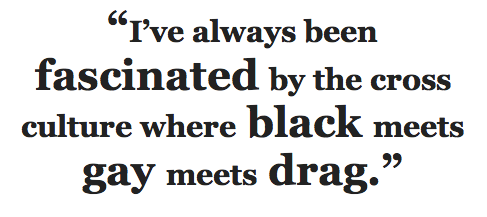
SB: Well, I feel like people like me are more down with black culture than certain black people. I mean, there is such a thing as self-loathing. There are self-loathing blacks; there are self-loathing women and gays and Jews—those people who don’t like themselves for what they are. And they’ll soft-pedal the shit. But there are other people who are kind of what you consider to be the outsiders who will go to bat. And I think we all have a little bit of different souls in us. I don’t know, maybe I was black in my last life, honey, ‘cause since I grew up in Flint, Michigan, and would listen to Motown on the AM radio, I was there and it took me there, and it has always taken me there. I just have great, deep wells of connection and empathy for the black experience, and it’s genuine. I have great, great, great love and respect for black culture, and without it we would be not even a tenth of who we are in this country.
MS: Even in the late-eighties, early-nineties, you were dropping ballroom/vogue vernacular in your own shows and in your numerous guest appearances on Late Night with David Letterman. I love one instance when you say to Letterman, “Do not throw shade at me, Miss Letterman. Paris is burning, girl,” to which he responds, “Anybody have any idea what the hell she’s talking about?” Today, this vernacular has been mainstreamed by shows like Ru Paul’s Drag Race, but you referenced it over twenty years ago as it was happening. How did you even have access to that culture?
SB: Ya know something? I think it was just part of who I am and what I found attractive in that culture. I mean, I was friends with Paul Mooney, I was friends with [former Vogue magazine editor-at-large] Andre Leon Talley; I had the kind of friends who were exposing me culturally and in the fashion sense and musically to those experiences, and I wasn’t afraid of it.